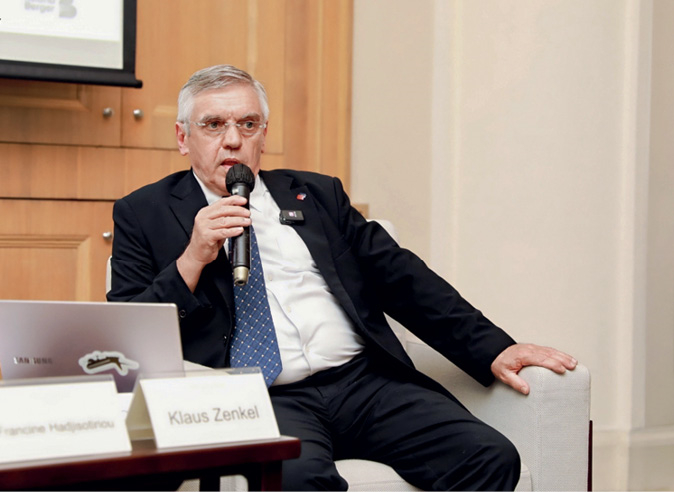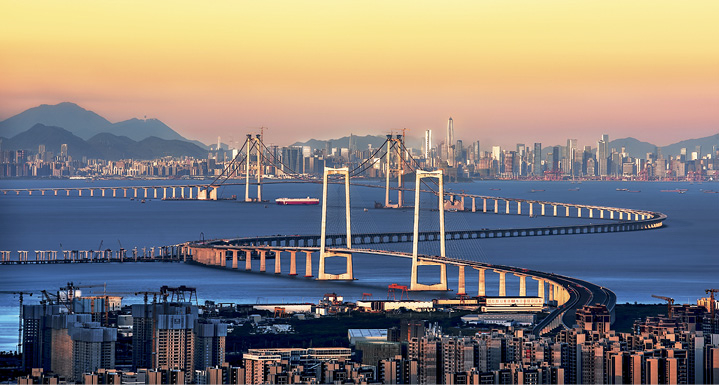
Klaus Zenkel, vice president of the European Union Chamber of Commerce in China.
 Headquartered in Cologne, Germany, the TÜV Rheinland Group is a leading independent third-party testing, inspection, certification, training, and consulting company, with a history of over 150 years. It has three wholly-owned subsidiaries in China’s Greater Bay Area – a development cluster comprising Hong Kong, Macao and nine cities in Guangdong Province on the mainland. Since 2018, the company has invested more than RMB 220 million in this region. Over the past three years especially, its investment has been increasing, with an advanced testing center established in the Greater Bay Area, focusing on the development of new-energy vehicles (NEVs), information technology, artificial intelligence, and energy storage.
Headquartered in Cologne, Germany, the TÜV Rheinland Group is a leading independent third-party testing, inspection, certification, training, and consulting company, with a history of over 150 years. It has three wholly-owned subsidiaries in China’s Greater Bay Area – a development cluster comprising Hong Kong, Macao and nine cities in Guangdong Province on the mainland. Since 2018, the company has invested more than RMB 220 million in this region. Over the past three years especially, its investment has been increasing, with an advanced testing center established in the Greater Bay Area, focusing on the development of new-energy vehicles (NEVs), information technology, artificial intelligence, and energy storage.Tina Jiang, managing director of TÜV Rheinland’s branch in Guangdong, explains the region’s attraction for her company: “In frontier areas, such as autonomous driving, 5G Internet of Things applications, robots, and intelligent equipment, the Greater Bay Area has preferential policies for investors and a good business climate, which gives us an opportunity to leverage our edge in electronic information technology, new materials, and NEVs.”
The Greater Bay Area currently has eight trillion-dollar industrial clusters, such as new generation electronic information, green petrochemical, smart home appliances and automobiles, as well as some emerging sectors, including NEVs, new energy storage, and solar power.

A technology expert for electronic & electrical products is testing a toy car to make sure it meets TÜV Rheinland’s certification standards. Photo courtesy of TÜV Rheinland
 Factors for Foreign Investment
Factors for Foreign Investment “TÜV Rheinland is a participant in and witness of China’s reform and opening-up, doing business in the Chinese market for nearly 40 years,” Jiang said. The company has seen the scale and scope of market access by foreign investors expand, and the foreign investment policy system improve by leaps and bounds.
Klaus Zenkel, vice president of the European Union Chamber of Commerce in China, has also noted the rapid economic growth of the Greater Bay Area and its enabling climate for innovation, bringing manufacturing, financial and scientific research and development centers together. “Industrial facilities are easily available. That’s why many European companies plan to expand their businesses in the region,” he said in an exclusive interview with China Today. EU enterprises are particularly optimistic about the business environment in the Greater Bay Area, given its advanced infrastructure and complete industrial chain, Zenkel added.
In 2018, the Greater Bay Area’s economic aggregate was RMB 10.8 trillion. In 2019, a national development plan for the region was announced, and by 2023, the aggregate had crossed RMB 14 trillion. It means the Greater Bay Area has created one-ninth of the national economic output though it has less than 0.6 percent of China’s total land area.
“The Greater Bay Area is one of the regions with the highest degree of openness and the strongest economic vitality in China, owing to its big market and strong support from the production supply chain, as well as the institutional edges of ‘one country, two systems’ for Hong Kong and Macao,” Zenkel said.
According to the Science and Technology Clusters Ranking 2023 published by the World Intellectual Property Organization, the Shenzhen-Hong Kong-Guangzhou cluster ranked second in the world for the fourth consecutive year. In addition, the Greater Bay Area leads the country in inputs in R&D, the number of valid invention patents and international patent applications under the Patent Cooperation Treaty.
In 2023, the Chinese government issued a guideline to improve the climate for foreign investment and attract more funds. It emphasized equal treatment for foreign enterprises, and said foreign enterprises will be supported in terms of talent, supervision and taxation, conveying the government’s intention to expand opening-up.
This June, the EU Chamber of Commerce in China released the European Business in China – Business Confidence Survey 2024. Forty-five percent of the European enterprises in China surveyed reported market opening in their industry, an increase of nine percentage points year-on-year.
Zenkel said in south China, the attitude is even more buoyant, with 73 percent of the respondents saying they want to expand their business, and 61 percent saying it is easier to do commercial trade in south China.
More positive signals were sent in July, when the 20th Central Committee of the Communist Party of China announced reforms would be deepened at its third plenary session. At the tone-setting meeting, instructions were given for promoting high-level opening-up and expanding the utilization of foreign capital. It said institutional opening would be expanded, market access further relaxed for foreign-funded companies, and their legitimate rights and interests protected. Their right to be treated on par with domestic companies would also be protected.

The main line of the Shenzhen-Zhongshan Link, a mega cross-sea passage in the Guangdong-Hong Kong-Macao Greater Bay Area.
Growing with China
In Zenkel’s view, the Greater Bay Area’s infrastructure and interconnection are a key factor for the growth of European enterprises based there. For example, the Hong Kong-Zhuhai-Macao Bridge, which opened in 2018, has slashed travel time between the three cities to 30 minutes from five hours and created a “one-hour life circle,” meaning all the destinations in the region can be accessed in an hour.
When the Shenzhen-Zhongshan Link, a cross-sea bridge and tunnel connecting the two cities in the east and west, respectively, opened on June 30, it was another big news for foreign investors. The total traffic volume in the first week of its opening crossed 720,000, and the average daily traffic volume now exceeds 100,000.
“The Shenzhen-Zhongshan cross-sea passage benefits the two cities and also (offers) more opportunities for the Greater Bay Area to develop its commerce, logistics and tourism as a whole,” Zenkel said. It will make it easier and faster for EU enterprises in Zhongshan to go to Shenzhen Airport.
“With more convenient transportation, China aims to promote coordinated regional development,” said Frank Holzmann, global vice president of electrical at TÜV Rheinland, at the Conference for Economic and Trade Cooperation between the Pearl River Delta and the Eastern, Western and Northern Regions of Guangdong Province, on June 19, 2024. “Eastern, western, and northern regions of Guangdong are gradually becoming industrial transfer recipients, where emerging industries, such as NEVs, photovoltaic technology, and hydrogen energy, are seeing rapid growth.” He added that TÜV Rheinland will strengthen cooperation with these regions, promote quality improvement and technological upgrading of local industrial chains, and support sustainable development and green and low-carbon industrial innovation in the region.
“TÜV Rheinland will expand its investment in the Greater Bay Area, with multidimensional businesses, such as testing equipment upgrade, laboratory expansion and expert team building, giving full support to develop the new quality productive forces, and promote the high-quality development of strategic pillar industries and emerging industries,” Jiang said.
Zenkel pointed out more reasons for EU companies’ keenness on doing business in China. China’s economy is stable and growing. More importantly, its consumer market is vibrant and products are upgraded very fast. “China is cultivating new consumption, which brings new opportunities to EU enterprises, too.” Digital consumption, Zenkel said, has facilitated cooperation between EU firms and Chinese hi-tech companies.
Last but not least, green consumption, the buzzword in China and elsewhere, is aligned with the business of many foreign enterprises. Eco-friendly innovation will attract more foreign tech companies with such expertise and technology, and that will in turn promote environmentally friendly products and services conforming to the global sustainable development trend and a healthier lifestyle.